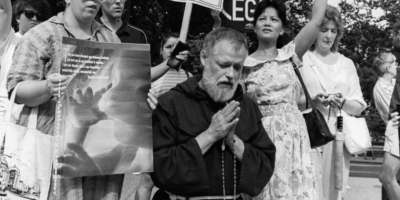Letters
A GIFT TO ANNE
Your review of Livia Bitton-Jackson’s book, I have Liveda Thousand Years: Growing Up in the Holocaust, prompts me to write this letter. I was born five years before Anne Frank and I am now 71. Many times in my life, I said to myself, “Look at what Anne Frank could have accomplished if she had been given a chance to live.” She has been an inspiration to me—as a proto-feminist, a Jew, and a person of amazing tolerance who looked for the good in all people.
After a year of study together with a group of six other women, I just became a bat mitzvah at age 70 for both Anne and myself I read a poem dedicated to Anne Frank and there was not a dry eye in the synagogue.
by Dr. Ann Moliver Ruben, Miami Lakes, FL
BABYING WOMEN
Why do you (like so many other women’s magazines) equate women with children? It’s okay to write about women and the effect of children on their lives, but “In the Children’s Library” (Fall1997)? What men’s magazine has articles for children? I expected LILITH to be a magazine about Jewish women!
by E. Frankel Hannawa Falls, NY
SIMCHA-DANCING
My daughter’s recent wedding was one of my most joyous and memorable simchas. Because she wanted her wedding to reflect her traditional Jewish values, she invited her female friends and family to a shower that would help to enhance the simcha for all. She wanted us to learn “‘simcha-dancing,” so we would be comfortable dancing at the wedding and could create an atmosphere of joy.
Some of my daughter’s friends had never attended a traditional Jewish wedding and for them the introduction to what would be happening at the reception provided more comfortable access. The same held true for my daughter’s new family.
Not only was the shower a great success—the energy that it raised continued for the next three weeks. The 50 women who gathered knew each other, experienced a camaraderie and looked forward to dancing together at the wedding. I highly recommend adding this to your list of ideas for Jewish bridal showers [Summer 1997].
by Judith Stem Peck, New York, NY
“CLEAN” CLOTHES
I recently read “You Are What You Wear,” by Sarah Wildman [Summer 1997] and thought it might interest you to know of a campaign that has been going on for over a year now. The “Clean Clothes Campaign” has been endorsed by local chapters of the NAACP and NOW, and has worked with UNITE.
Our first goal is to build a community consensus, articulated in a City Council resolution, that sweatshop apparel on our store shelves is not acceptable. Our second goal is to enable retailers to participate in this effort, gradually increasing their inventory of “clean” clothes
For more information, contact: Bjorn Skorpen Claeson, PICA (Peace through Inter american Community Action), 128Maine Street, Bangor, Me04401 (207) 947-4203; picaI@hamtel.tds.net
by Jordan Silverman, Burlington, VT
BODY SLAM
One might think from ads in LILITH that The Body Shop is a non-profit organization dedicated to raising women’s [consciousness]. In truth, the company is more than anything a brilliant marketer.
I have been aware of The Body Shop because of their involvement in Nepalese hand made paper, a subject I have researched for years, and because they gave an award to an “ecofriendly” housing development in my area. Had the housing been built, it would have threatened a sensitive fjord system. Secondly, the PR for their Nepalese products has been misleading to enhance their political correctness. Finding them insinuating themselves into LILITH with “feminist” messages feels like an assault.
LILITH needs advertising dollars. The Body Shop needs to sell cosmetics. Let The Body Shop put in ads which are straight. Let LILITH take care of its own journalistic content. The ads blur this line and that is their intention. Let’s have a few boundaries.
by Dorothy Field, Cobble Hill, British Columbia
URBAN LATENCY
Your article in the Fall issue, “Jewish Latency,” explored reasons young people often skip out on any form of Jewish involvement. However, two critical components were missing from the analysis—urban activism and questions of God.
Since moving to Philadelphiaten years ago, I have been searching for Jewish involvement that addresses my own core values of social service contributions. For me,being Jewish means living and working in the city and paying attention to the needs of its residents. Yet every Jewish organization I’ve explored seems to focus on the suburbs and on once-a year efforts to help the inner city homeless.
As for questions of God, several years ago I took a class called “Jewish, Alive and American,” through the Reconstructionist Rabbinical College. Our teacher did not want to talk about a definition of God or even her approach to thinking about God. How can you be an observant Jew, say the prayers, observe the holidays, if you don’t know who or what God is and noone wants to talk about it?
by Elizabeth Levine, Philadelphia, PA
A CONVERT’S TRIALS
Re: “Jewish Latency”: I am a 25-year-old Jewish (convert) mother in a life partnership with a non-Jewish man. I have gone “synagogue shopping” for several years and found that members of the congregation shave often turned a cold shoulder to me because of my age, relationship with a non-Jew, my economic status, the fact that I am a convert or a combination of factors. I’d like to appeal to your readership to reach out to Jews like myself, struggling to find communities in which we canfully participate without fear or shame for our lifestyles and loved-ones.
by Dorian D. Eder, Minneapolis, MN
Editor’s Note: In response to “Jewish Latency” in the Fall issue of LILITH, we received numerous queries about statistics on Jews and college education. We refer readers to the “Hillel Guide to Jewish Life on Campus,1996 Edition” edited by Ruth Fredman Cernea and published by The Princeton Review.


